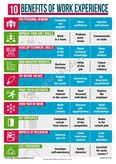 We've produced a new graphic on why work experience is important. This is available at our poster store. A great graphic for schools or colleges exploring the benefits of work experience with students. We welcome your comments.  1. Personal Reward The personal satisfaction from working on a real project that benefits a business or organisation cannot be understated. Such experiences can be a real booster for your confidence and motivate you towards your career goals.  2. Improve your Soft skills Communicating with others, working in a team, problem solving, these are all skills you will improve on in work. You will have to handle the real pressure of delivering on tasks or projects. Such competencies are transferable even if you are working in a field unrelated to the role you hope to do.  3. Develop Technical Skills. If you have hard skills in a specific area, work experience may give you the opportunity to wow an employer with your abilities, pick up tricks of the trade and could land you a job.  4. Gain Industry Experience As well as building technical skills you will find out how the company runs, where the industry is heading, career progression of employees and many other aspects of work. Such knowledge could be crucial at the interview stage of an application.  5. Career Taster If you’re not sure about your career goal, such an opportunity will help you assess if this career is a good fit without committing. Whilst at work you could also gain insights into jobs that you may not have considered. This could lead you to explore other career paths.  6. Prove you’re Motivated Some careers require you to undertaken a range of work experience to ensure you are serious. Finding a range of work opportunities whether paid, voluntary or as an intern will show a prospective employer your dedication to this profession.  7. Build your Network Work experience can open up to you the chance to network contacts that you may come across within the industry and with some leverage could see you extend your placement in your chosen field or gain further experience elsewhere.  8. Get a Job Many companies advertise jobs internally or recruit to those who are known by other employees. Gaining work experience is a route to landing a job. In some industries competition for jobs is so fierce that work experience is often the only route in.  9. Impress an Employer One recent survey says that 4 in 10* graduate jobs are only open to those with relevant work experience. For many employers nothing is more impressive than a candidate with relevant work experience. Having this on your CV puts you a cut above the rest of the applicants and gives you plenty to talk about.  10. Lifeskills Some employment opportunities are looking for candidates who have had a range of experiences that show a number of proven qualities. It’s not necessarily about what you have done but more what you have learnt from the experience and how this has improved you as a person. (Such as Police, Military, Fostering, Counselling) * Telegraph, education section Types of Work Experience
Apprenticeships, Casual Work, Gap Year, Insight Programmes, Internships, Project Work, Work Placements, Work Shadows, Voluntary Work,
1 Comment
16/8/2022 06:48:20 pm
It's interesting when you said that you should understand the industry of the company to gather more information about them. My nephew mentioned last night that he was hoping to find free training and career opportunities for his career path, and he asked if I had any idea what would be the best option to do to start learning. Thanks to this informative article, I'll tell him that it will be much better if he consults a well-known career training company as they can guide him throughout the process.
Reply
Your comment will be posted after it is approved.
Leave a Reply. |
Russ BannerI have 10 years experience of working in careers guidance and am director of CGC. We publish career infographics for schools and colleges Archives
November 2022
Categories |
|
|
